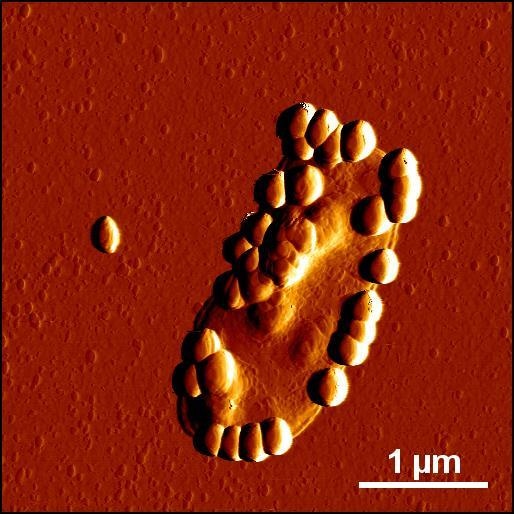Jan 30 2019
The intestinal microbiome is key for food processing as well as an accepted co-determinant for different diseases. Scientists at the University Medical Center of Johannes Gutenberg University Mainz (JGU) identified the impacts nanoparticles have on the intestinal microorganisms.
 Silica nanoparticles adhering to an intestinal bacterium visualized by atomic force microscopy. (Image credit: Stauber Group, Mainz University Medical Center)
Silica nanoparticles adhering to an intestinal bacterium visualized by atomic force microscopy. (Image credit: Stauber Group, Mainz University Medical Center)
The ultra-small particles stick to intestinal microorganisms, thus influencing their life cycle and also cross-talk with the host. One of the observations of scientists was that binding of nanoparticles blocks the infection with Helicobacter pylori, a pathogen involved in gastric cancer. The discoveries will inspire further epidemiological studies and open up new possibilities for the development of potential “probiotic” nanoparticles for food. The findings were reported in Science of Food.
Their minute size allows nanoparticles to have unique characteristics and potentials, such as binding to microstructures. Nanotechnology is a key driver of innovation for medicine as well as consumer industry. Medicine focuses on improving diagnostics and therapeutics, while the main focus of the industry is on product optimization. Therefore, synthetic nanoparticles are already in use as additives to enhance the characteristics of food. However, how can nanotechnology be more efficiently and safely used in food? And are there hidden effects of nanoparticles, which has to be further utilized?
The composition and diversity of human microbiome are significantly influenced by nutrition. “Microbiome” represents all colonizing microorganisms found in a human being, particularly, all the bacteria in the gut. Simply put, an individual’s microbiome comprises both his intestinal flora and the microorganisms that colonize his nasal cavity, mouth, and skin.
Since the microbiomes have negative or positive effects on the host, researchers and clinicians are interested in it. These include modulation of the immune system, vascular aging, metabolism, hormonal system, and cerebral functioning. The composition of the microbiome appears to have a key role to play in the development of a range of disorders, such as cancer, cardiovascular diseases, obesity, allergies, and even mental disorders.
Hence, nutrition and its containing nanoparticulates may affect the microbiome-host balance, finally influencing human health. In order to reduce potential risks and, ideally, promote health, the impact of dietary nanoparticles needs to be understood.
Professor David J. McClements, Department of Food Science, University of Massachusetts, Amherst
Prior to our studies, nobody really looked whether and how nano-additives directly influence the gastrointestinal flora. Hence, we studied at a wide range of technical nanoparticles with clearly defined properties in order to mimic what happens to currently used or potential future nanosized food additives. By simulating the journey of particles through the different environments of the digestive tract in the laboratory, we found that the all tested nanomaterials were indeed able to bind to bacteria.
Professor Roland Stauber, Department of Otolaryngology, Head, and Neck Surgery, Mainz University Medical Center
The researchers found that these binding processes can have various results. On one hand, the immune system less efficiently identified the nanoparticle-bound microorganisms, which may result in increased inflammatory responses. On the other hand, “nano-food” exhibited advantageous effects. In cell culture models, silica nanoparticles obstructed the infectivity of Helicobacter pylori, which is regarded as one of the main agents involved in gastric cancer.
“It was puzzling that we were able to also isolate naturally occurring nanoparticles from food, like beer, which showed similar effects. Nanoparticles in our daily food are not just those added deliberately but can also be generated naturally during preparation. Nanoparticulates are already omnipresent,” concluded Stauber.
The knowledge gained from the research will enable strategies to be derived for developing and utilizing natural or synthetic nanoparticles to alter the microbiome as advantageous ingredients in functional foods. “The challenge is to identify nanoparticles that fit the desired purpose, perhaps even as probiotic food supplements in the future. Challenge accepted,” emphasized Stauber and his team.